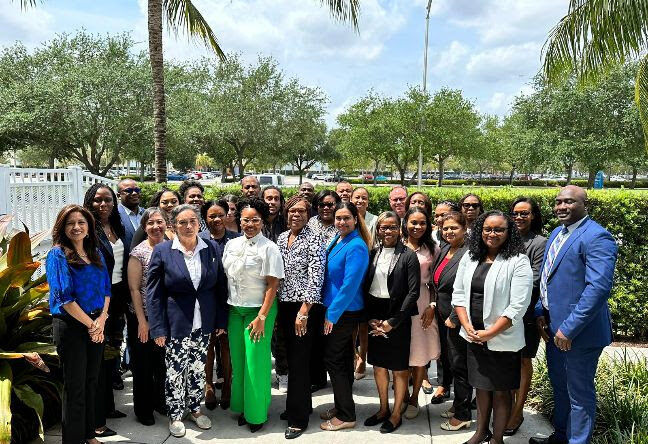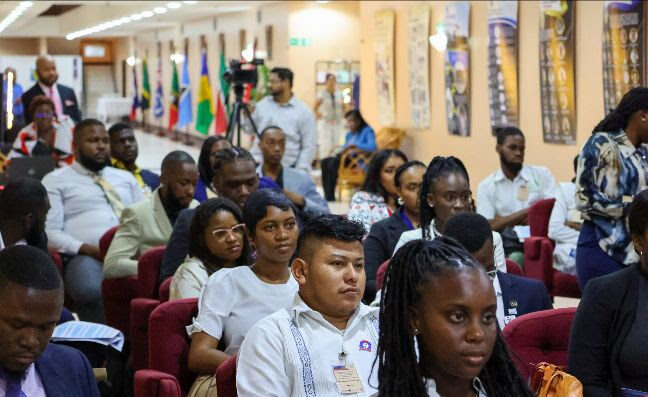The ink was hardly dry on the ruling of Justice Godfrey Smith, who yesterday quashed the suspension of Commissioner of Police Wendel Robinson, before the Police Service Commission (PSC) issued another suspension letter for Robinson to one of his lawyers.
The letter, reportedly hand delivered to attorney Cosbert Cumberbatch mere hours after Robinson’s victory, said the top cop was suspended, this time pending the hearing and outcome of internal disciplinary charges of discreditable conduct under Section 105 of the Constitution, which speaks to the Appointment Etc. Of Police Officers, and he will be informed of the next step.
These charges were filed last month, even while the court was yet to determine whether Robinson’s first suspension on April 5 was lawful. He had been suspended indefinitely, without any explanation of what would be next.
Sources close to the matter said the latest administrative action was pre-planned, in the event that Robinson won the argument that his first suspension was unfair, unlawful and null and void.
So, while he was celebrating with the support of friends and fellow officers who showed up at the High Court for the ruling which was delivered via Skype, the PSC was already sitting with its legal advisors, finalising the recent suspension papers, ensuring that Robinson would not make it back to his office at Police Headquarters to sit as Commissioner of Police until all legal battles have been thrashed out.
Robinson was cautious as he celebrated, saying he is prepared to go for the long haul if the PSC decides to appeal the ruling of Justice Smith, who said the body acted unlawfully when it suspended him more than six months ago.
He spoke exclusively with OBSERVER media via phone, saying he was confident of a win all along and would respect the process of any appeal – again with confidence of winning.
“I was expecting that decision, especially based on what I saw advocated in court on the 5th of October when there were legal arguments advanced by both sides, and I thought that having considered the submissions made by Sir Richard Cheltenham [Robinson’s lawyer], I was convinced it would have been victory,” he said.
Robinson, who worked along with the legal team he hired, and who is himself a lawyer and experienced prosecutor, thanked those who have been standing by his side from the onset, until this day.
“Of course I appreciate all the prayers that have been meted out on my behalf and all the support from various institutions, both locally and also internationally,” he said.
“I suppose this might be the beginning of a longer journey but I will watch and see. But I am confident, I have always been confident, in as much as it has been very painful for me,” he added.

In his ruling in the 24-page judgment, which is in OBSERVER media’s possession, the judge did three things. He said, “(1) Certiorari is granted quashing the decision of First Respondent (Police Service Commission) suspending the Claimant (Wendel Robinson). (2) The Claimant is reinstated to his office as Commissioner of Police with immediate effect. (3) Prescribed costs are awarded to Claimant in accordance with CPR 2000.”
This simply means that the suspension, the first one, is no longer in effect, was deemed unlawful, and the Commission has to pay the costs that Robinson incurred in legal fees.
Robinson was suspended on April 5 this year under Section 37 of the Police Act and in accordance with section 16(2) of the Regulations after three of his male subordinate colleagues accused him of sexual harassment or inappropriate conduct.
The officers’ complaints included alleged harassment incidents from 2016 to February 2018, but none of them, according to the PSC, were officially filed until nearing the end of March this year.
A month after his suspension, Robinson filed his claim for judicial review and, except for one delay when his lawyer was absent due to illness, the case was handled swiftly.
The hearing of arguments was done on October 5 in the High Court, and both sides had been given time to file further submissions, on or before October 19, and an early judgment was promised, once the deadline for submissions were met.
While the challenge to his suspension was ongoing, and the court was yet to determine the legality of the suspension and section of the police regulations under which it was done, a three-member team from the CARICOM Implementing Agency for Crime and Security (IMPACS) was brought in in August to investigate the complaints against Robinson.
It was out of their probe that internal disciplinary charges were filed against the top cop this month, accusing him of discreditable conduct.
Meanwhile, in the judicial review trial this month also, it was Robinson’s argument that the PSC unlawfully suspended him from office, and he sought, among other reliefs, to have that decision quashed.
The PSC countered that it acted lawfully pursuant to section 16 of the Police (Discipline) Regulations in suspending the top cop.
When the case started and what has the judge said …
The Commissioner, in his initial claim filed in May, alleged that there were 14 procedural irregularities, which “permeated the allegations against him.“ In addition to this, there were 16 diffuse grounds for judicial review and 13 separate reliefs being sought.
However, Justice Smith noted in his judgment that by the time the Commissioner filed his written submissions at the end of August, he had apparently “distilled the issues he wanted the court to determine.”
Those issues were: “Whether the Police Service Commission had the discretion to suspend the Applicant without his first being charged with an offence? If the Commission did have such discretion, was that discretion properly and lawfully exercised? Is an appropriate, alternative remedy available?”
The court added another issue at the commencement of the hearing on October 5 2018, and that was “Whether or not the Regulations apply to the Commissioner?”
According to Justice Smith’s ruling, neither side had addressed this issue in their original written submissions, and consequently, each side was permitted to file supplementary post-hearing submissions on that single point. The hearing then proceeded.
The judge broke down yesterday’s decision, answering the following questions: Whether the Regulations apply to the Commissioner. To this the judge said that the Regulations, without doubt, apply only to the ranks identified within the law and those ranks included officers from the rank of inspector and below. Thus, they did not apply to the Commissioner of police.
Section 37. (1) of the Act under which Robinson was charged, states that, “An Inspector, subordinate police officer or constable against whom any complaint or information for an offence punishable on summary conviction or on indictment is laid, or against whom a charge is made for breach of any disciplinary regulation made under this Act, may, pending, and until the final determination of such complaint, information or charge (a) be suspended from duty and placed on half-pay by the Commission.”
Robinson’s argument on that point was that even if there was a right to suspend, he had not even been charged with any offence when he was suspended or even up to the time the judicial review case was heard.
The judge agreed that, “To the extent that section 37 ostensibly applies only to officers at the rank of inspector and below, the section should be read applying the ejusdem generis rule otherwise senior officers would be subject to unequal treatment of law and deprived of natural justice.”
He also agreed with the claimant’s argument that when a legislative provision sets out who or what is within the meaning of an expression, it ordinarily means that no one else or nothing else is.
“If it wishes to say that its provisions are other than exhaustive, it usually says so, in terms such as: ‘without prejudice to the generality of the expression,’ or ‘the following are included in’ or ‘in construing the expression,” he wrote.
The next question was, whether the discretion to suspend Robinson was exercised rationally or lawfully? While the third one asked whether the PSC acted in breach of the principles of natural justice in suspending the Claimant without first giving him an opportunity to be heard while the fourth and fifth questions were whether the PSC acted ultra vires section 37 of the Police Act in suspending the Claimant without first charging him or initiating an investigation and; is an appropriate, alternative relief available.
The court said none of these were respected.
The PSC, in its written submissions, contended that there was an alternative remedy, which ought to have been exhausted first, namely an appeal to the Public Service Board of Appeal.
But, the judge said he did not think that an appeal to the Public Service Appeal Board would have provided an appropriate alternative relief, especially given the aspects of constitutional interpretation are traditionally reserved for the high court. – Antigua Observer




